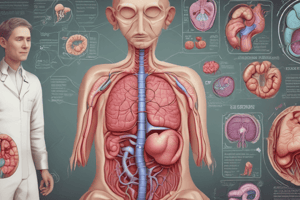Podcast
Questions and Answers
What is a common symptom of vascular ring compression of the trachea?
What is a common symptom of vascular ring compression of the trachea?
- Jaundice
- Stridor (correct)
- Dysphagia
- Vomiting
Which of the following is NOT a characteristic of Beckwith-Wiedemann syndrome?
Which of the following is NOT a characteristic of Beckwith-Wiedemann syndrome?
- Diaphragmatic hernia (correct)
- Macrosomia
- Neonatal hypoglycemia
- Umbilical hernia/omphalocele
What is the gold standard for diagnosing malrotation with midgut volvulus?
What is the gold standard for diagnosing malrotation with midgut volvulus?
- Upper gastrointestinal series (correct)
- CT scan
- MRI
- Abdominal x-ray
What is a common complication of biliary cysts?
What is a common complication of biliary cysts?
What is the most common underlying condition leading to cholangiocarcinoma?
What is the most common underlying condition leading to cholangiocarcinoma?
What is the recommended treatment for biliary cysts?
What is the recommended treatment for biliary cysts?
What is a characteristic finding on an upper gastrointestinal series in malrotation with midgut volvulus?
What is a characteristic finding on an upper gastrointestinal series in malrotation with midgut volvulus?
What is the initial evaluation for clinically stable patients with suspected malrotation with midgut volvulus?
What is the initial evaluation for clinically stable patients with suspected malrotation with midgut volvulus?
What is the name of the syndrome that is characterized by macrosomia, macroglossia, hemihyperplasia, umbilical hernia/omphalocele, and neonatal hypoglycemia?
What is the name of the syndrome that is characterized by macrosomia, macroglossia, hemihyperplasia, umbilical hernia/omphalocele, and neonatal hypoglycemia?
What is the recommended follow-up for patients with Beckwith-Wiedemann syndrome?
What is the recommended follow-up for patients with Beckwith-Wiedemann syndrome?
Flashcards are hidden until you start studying
Study Notes
Vascular Ring
- Vascular rings encircle the trachea and/or esophagus, causing compression.
- Compression of the trachea presents with stridor.
- Compression of the esophagus presents with dysphagia, vomiting, or recurrent food impactions.
Volvulus
- Intestinal malrotation is a common cause of bilious emesis in infants, especially those with other congenital anomalies.
- Chronic, episodic symptoms occur with intermittent volvulus.
- Malrotation with midgut volvulus presents with bilious vomiting in neonates.
- Abdominal x-ray may be normal, so an upper gastrointestinal series is required for diagnosis.
- The upper gastrointestinal series shows a right-sided ligament of Treitz and a corkscrew duodenum.
Wilms Tumor
- Beckwith-Wiedemann syndrome (BWS) is characterized by macrosomia, macroglossia, hemihyperplasia, umbilical hernia/omphalocele, and neonatal hypoglycemia.
- Patients with BWS are at increased risk of developing Wilms tumor and hepatoblastoma.
- Abdominal ultrasound and alpha-fetoprotein level testing are recommended for patients with BWS.
Biliary Tract Disorders
Biliary Cyst
- Biliary cysts may be asymptomatic or present with abdominal pain, a right upper quadrant mass, and/or jaundice.
- Cyst resection is necessary to decrease the risk for malignancy.
- Biliary cysts can initially present with complications, such as cholestasis and pancreatitis due to distal biliary obstruction.
- A biliary cyst should be suspected in a neonate with cholestasis and a mass in the right upper quadrant.
Cholangiocarcinoma
- Cholangiocarcinoma is a biliary tract epithelial malignancy that often occurs in those with fibropolycystic liver disease or primary sclerosing cholangitis due to underlying ulcerative colitis.
- Most cases present with subacute right upper quadrant pain, weight loss, and signs of biliary obstruction, such as jaundice, cholestatic liver enzyme pattern, and dilation of the intrahepatic or common bile duct.
Studying That Suits You
Use AI to generate personalized quizzes and flashcards to suit your learning preferences.




